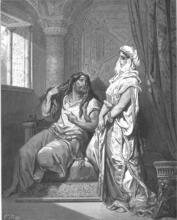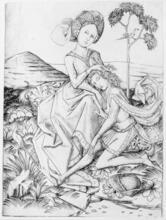Delilah: Bible
Although Delilah’s story centers on her narrative with Samson, she is portrayed as independent from the men around her. She is named without the context of a male relative or spouse, although her identity remains unclear. Delilah accepts a bribe from the Philistines to reveal the source of Samson’s strength and seems to express no doubt about her choice to betray her lover. Whether or not she ultimately cuts Samson’s hair varies between texts.
Delilah is the only woman in the Samson story whose name is given. Whatever its etymology, her name is a wordplay on Hebrew layla, “night,” for as the night overcomes the mighty sun (the name Samson, Shimshon, is related to “sun,” shemesh), so Delilah overcomes the apparently invincible strong man, Samson.
Delilah’s Identity
The biblical story, in which Samson falls in love with her and then the Philistines use her to learn the secret of his strength, leaves us with more questions than answers about Delilah. She is not, as biblical women typically are, identified in terms of a man (husband, father, or brother). All we know is her name, which is a Hebrew name, and the place where she lives, the valley of Sorek, which lay between Israelite and Philistine territory. She and Samson are apparently lovers but are not married.
What is her status in society? Is she a wealthy widow, like Judith? A sexually autonomous woman, like the woman in the Song of Solomon? A harlot, as is commonly supposed?
Delilah is not called a harlot. Samson is the profligate, and it is perhaps because he visits a harlot in Judg 16:1–3 that some readers conclude that Delilah is also a harlot (the phrase “and after that he fell in love with a woman …” [Judg 16:4] also links the two women). Delilah is not even called a Philistine, though it is usually assumed that she is because (1) Samson is attracted to Philistine women, (2) she has dealings with the Philistine rulers and it is unlikely that the Philistines would seek to enlist the aid of an Israelite woman, and (3) she betrays the Israelite hero to his enemies, and it is unlikely that a biblical author would portray one of his countrywomen doing such a scandalous thing without further comment. All are good reasons, but none is conclusive. Actually, only one of the three women with whom Samson is involved—his wife—is specifically identified as a Philistine.
Delilah’s Actions
Delilah accepts a bribe to reveal the source of Samson’s strength to the Philistines. The bribe would make sense if the woman was Israelite—she would probably need enticement to betray a leader of her people. Each of the Philistine rulers (probably five of them, representing the five important Philistine city-states) pays her eleven hundred pieces of silver. On the other hand, if Delilah is Philistine, perhaps the bribe simply underscores what a treacherous woman she is.
The text reports that Samson loves Delilah (16:4), but not that she loves him—a hint, perhaps, that she does not love him and will have no qualms about betraying him.
Three times Delilah tries unsuccessfully to learn the secret of Samson’s strength. The Philistines instruct her to “entice” (NRSV, “coax”) Samson, which suggests something sexual, but the text reports only her persistent questioning and nagging. She makes no secret of her intention. By the fourth time, it is apparent that she will carry out whatever procedure Samson describes, but Samson tells her anyway, and she cuts his hair, enabling the Philistines to capture him. The Hebrew text has Delilah cut Samson’s hair, just as she did the binding (twice) and weaving of his hair. The text is rather difficult, however, and some of the versions introduce a “man” or a “barber” and have him cut Samson’s hair.
Bal, Mieke. Lethal Love: Feminist Ziterary Readings of Biblical Love Stories. Indiana: 1987.
Bal, Maria Gertrudis, Mieke Bal, and Ruth Richardson. Death and Dissymmetry: The Politics of Coherence in the Book of Judges. University of Chicago Press, 1988.
Exum, J. Cheryl. Fragmented Women: Feminist (Sub)versions of Biblical Narratives. Sheffield, England: 1993.
Exum, J. Cheryl. Plotted, Shot, and Painted: Cultural Representations of Biblical Women. Sheffield, England: 1996.
Gunn, David M., Tamar Kadari, Anton Karl Kozlovic, Klaas Spronk, and Ilja M. Veldman. “Delilah.” Encyclopedia of the Bible and Its Reception online resource. 2012.
The EBR online resource has extensive information about Delilah, although a paid account is needed to access the entries.
Meyers, Carol, General Editor. Women in Scripture. New York: 2000.
Sasson, Jack M. “Who Cut Samson’s Hair? (And Other Trifling Issues Raised by Judges 16).” Prooftexts 8 (1988): 333–339.
Mieke Bal's "Death and Dissymmetry: The Politics of Coherence in the Book of Judges" (U. of C. Press 1988).











